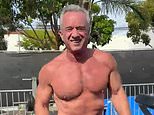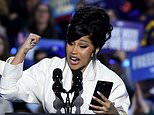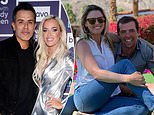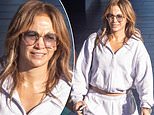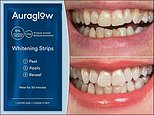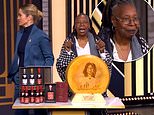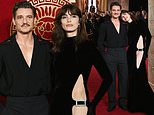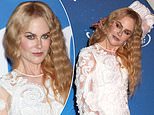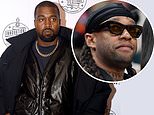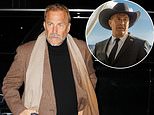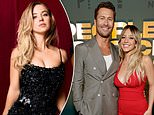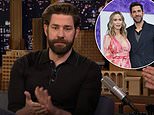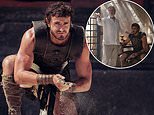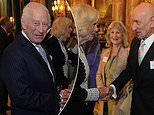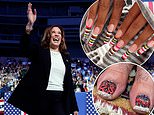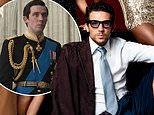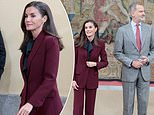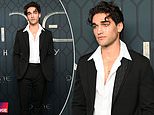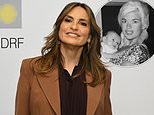Tesla reaches confidential settlement with family of Apple engineer, 38, killed in fireball Model X crash 'who was playing game on his phone while car was on self-driving mode'
- Walter Huang, 38, was using the Autopilot mode when he crashed into a concrete barrier on a California freeway in 2018
- His family filed a negligence and wrongful death suit against Elon Musk's Tesla
- Tesla claimed he was playing games on his phone at the time of the crash but settled the case the day before a trial was set to begin
Tesla has settled a lawsuit brought by the family of an Apple engineer they claimed was playing games on his phone when he was killed in a fiery crash while the vehicle was in self-driving mode.
Walter Huang, 38, died when his Tesla Model X smashed into a concrete barrier on a California freeway in March 2018.
His family filed a negligence and wrongful death lawsuit in 2019 seeking to hold Elon Musk's Tesla liable for repeatedly exaggerating the capabilities of the car's self-driving technology.
But on Monday, just a day before the trial was set to begin, Tesla reached an undisclosed settlement in the case.
In a court filing requesting to keep the sum private, Tesla said it agreed to settle the case in order to 'end years of litigation.'

Tesla has settled a lawsuit brought by the family of a Walter Huang (pictured with wife) who died in a crash while relying on the company´s semi-autonomous driving software

Huang was killed in March 2018 when his Tesla Model X slammed into a concrete barrier on a California freeway

Huang's family filed a negligence and wrongful death lawsuit in 2019 seeking to hold Tesla
They claimed the technology, dubbed Autopilot, was promoted in egregious ways that caused vehicle owners to believe they didn´t have to remain vigilant while they were behind the wheel.
Evidence indicated that Huang was playing Sega's Total War: Three Kingdoms video game on his iPhone when he crashed into a concrete highway barrier on March 23, 2018.
After dropping his son off at preschool, Huang activated the Autopilot feature on his Model X for his commute to his job at Apple.
But less than 20 minutes later, Autopilot veered the vehicle out of its lane and began to accelerate before barreling into a barrier located at a perilous intersection on a busy highway in Mountain View, California.
The Model X was still traveling at more than 70 miles per hour at the time.
Huang died at the gruesome scene, leaving behind his wife and two children, now 12 and 9 years old.
In their case, his family stated that he had complained about faults with the Autopilot system numerous times before the fatal crash.
An investigation by the US National Transport Safety Board investigation was unable to provide a definitive reason for the collision.
It found it was likely to a combination of 'limitations' with the Autopilot software and 'lack of response due to distraction likely from a cell phone game application and overreliance' on the self-driving feature.

Huang's 2017 Tesla Model X was traveling at 71 mph when it crashed against a barrier which had been impacted in a collision just 11 days prior

Tesla says Autopilot is intended for driver assistance and that drivers must be ready to intervene at all times. The company says drivers should have both hands on the wheel and stay in control of the vehicle
The body also slammed California officials for failing to fix the barrier after it was damaged in another crash 11 days prior to when Huang was killed.
The case was just one of about a dozen scattered across the US raising questions about whether Musk´s boasts about the effectiveness of Tesla´s autonomous technology fosters a misguided faith the technology.
The company also has an optional feature it calls Full Self Driving.
Tesla says Autopilot is intended for driver assistance and that drivers must be ready to intervene at all times with both hands on the wheel.
The U.S. Justice Department also opened an inquiry last year into how Tesla and Musk promote its autonomous technology, according to regulatory filings that didn't provide many details about the nature of the probe.
Tesla, which is based in Austin, Texas, prevailed last year in a Southern California trial focused on whether misperceptions about Tesla´s Autopilot feature contributed to a driver in a 2019 crash involving one of the company´s cars.
Shares of Tesla Inc., down 30 percent this year, slipped 1 percent before the market opened Tuesday.


